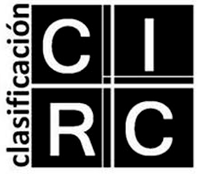
Ethical statement about publication and malpractice
RiHC. Revista internacional de Historia de la Comunicación declares its commitment to the ethical standards of publication that support the correct development of research and of its institutions. This ethical commitment must be endorsed by all parties involved in the journal's publication process, from management to authors and reviewers.
The criteria for the positive evaluation of the submitted articles will exclusively be the originality, relevance and clarity of the contribution and its suitability to the journal. No academic status will be required of the authors for the publication of their work (it is not necessary to hold a doctorate degree to publish in the journal).
The complete evaluation and review process will be anonymous. Authors must prepare the original file in order to ensure their anonymity (as detailed in the Guidelines for authors). Reviewers must not accept to undertake an evaluation if they can identify the individual or collective authorship of the proposed article from its content. The Editorial Board will, to the best of their knowledge, consider possible links to the author when assigning reviewers. Likewise, the confidentiality and anonymity of all of the information emanating from the evaluation process will be maintained, as well as any clarifications or complaints that may arise from it.
RiHC condemns plagiarism and will proceed to the elimination or non-publication of those works that evidence this practice. The author must guarantee that the submitted work is original and that it does not infringe the copyright of any third party. Likewise, the reviewers must notify the Editorial Board of any suspicion of plagiarism found in the manuscripts submitted to them.
In the case of shared authorship, all authors must state that the content of the proposed article has been agreed upon. The articles submitted may not have been presented to or published by any other media.
The authors are responsible for the veracity of the data obtained or cited, that may not be distorted or falsified in order to confirm the initial hypothesis. They must also consult those materials that are most up to date and appropriate for the topic of the article. It is necessary to include as authors all of the people who have participated in a relevant way in the conceptual design and planning of the work, in the interpretation of the results and in the writing up of the research. The order of the authors must reflect the degree of participation. The content of each article is the exclusive responsibility of the authors.
The reviewers will critically and honestly evaluate the articles sent on to them. They must notify the Editorial Board of their rejection of the evaluation of the article if they consider that they are not qualified to carry out the review or that they have a conflict of interest with any of the authors or elements that make up the article. The reviewers will fill out a detailed report in which they will explain their evaluation and argue their decision, especially if the article is rejected. For this purpose, RiHC will provide a template with the main points to be covered by the review, with the possibility of adding further comments at the end.
Anonymously, the authors will be informed of the decision of the evaluation and will be provided with the report prepared by the different reviewers. If the reviewers consider that the article is publishable after revision, the authors will be required to make these changes before the final publication of the article. After receiving the modified article, the decision to finally publish or not will be made by the Editorial Board, on the grounds of the degree of compliance with the reviewer’s comments.
If the authors identify an error in their published article, they must communicate it to the editors to make and publish the corrections in part and in the appropriate terms, following the editorial standards of the journal.
In addition to the above, RiHC takes as a reference the Code of Ethics and Good Practices that, for editors of scientific journals, establishes the Committee on PublicationEthics (COPE). In the event of conflicts of interest, the COPE flow charts will be followed. (https://publicationethics.org/core-practices).

The International Journal of Communication History has signed the San Francisco Declaration on Research Assessment.
RIHC has signed San Francisco Declaration on Research Assessment












